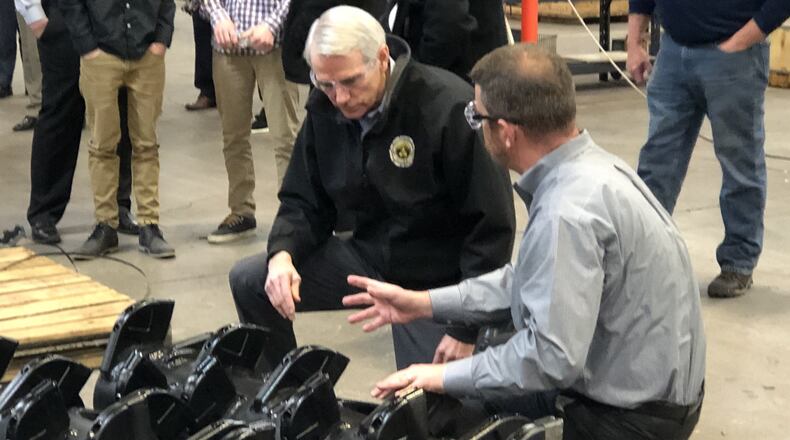“Yeah, we will agree, I hope, next Tuesday to a resolution that says, ‘Let’s follow the procedure that was used the last time this was done,’” he said after a workforce development discussion and tour of Fecon manufacturing facilities in Lebanon.
In 1999, the Senate acquitted President Bill Clinton after his impeachment by the House. Three witnesses were called and made depositions, portions of which were viewed by the Senate.
“You listen to the House managers and you listen to the president’s legal team,” Portman added. “Then you have a chance for senators to ask questions and to get answers. Then you have the opportunity to decide if you need additional information to fill in the gaps.”
Portman said he pushed hard to get the defense funding to Ukraine that was allegedly withheld at Trump’s order. He added that, unlike during the Obama administration, Ukraine was getting U.S. support in its war with Russia.
RELATED: How does impeachment work? Here is the step-by-step process
The House voted to impeach Trump for abuse of power, accusing him of pressuring Ukraine’s leader by withholding the defense funding to investigate Democratic presidential candidate former Vice President Joe Biden. The House this week turned the case over to the Senate for a trial.
“The idea was they were to supposed to get all the information needed. If there’s more information that’s needed, there will be an opportunity in the process for us to seek new information or call new witnesses,” Portman said.
“I think it should be a fair process,” Portman added, pointing out he opposed suggestions that a motion for dismissal should be used to quickly end the trial. “I think we should hear from both sides.”
Portman said he was unsure whether the Senate should call Lev Parnas, an associate of Rudolph Giuliani, Trump’s personal lawyer. Parnas, who is facing federal charges in New York, recently turned over documents to the House Intelligence during the impeachment inquiry.
“We’ll see, I don’t know enough yet,” Portman said.
Portman answered questions in the lobby of Fecon, an agricultural machinery manufacturer in Lebanon, after touring the plant with employees, plus students and officials involved in a unique workforce development program.
The program is a collaboration of Warren County Career Center, United Way of Warren County, economic development officials and local businesses struggling to find qualified employees.
“I thought it was a great opportunity. I would be a fool not to take advantage of it,” said Ricky Tussey, 18, of Franklin.
Portman talked with the officials and three current or former students working at Fecon through the program: Tussey, Andrew VanDyke, 19, of Waynesville; and Zachary Layman, 18, of Morrow.
“For a lot of people, it’s a much better deal to graduate from high school with a skill,” Portman said.
About the Author

